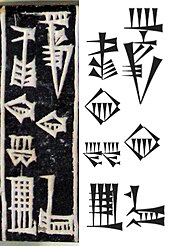 Global Information
Global InformationGenitive case information
This article needs additional citations for verification. (July 2023) |

In grammar, the genitive case (abbreviated gen)[2] is the grammatical case that marks a word, usually a noun, as modifying another word, also usually a noun—thus indicating an attributive relationship of one noun to the other noun.[3] A genitive can also serve purposes indicating other relationships. For example, some verbs may feature arguments in the genitive case; and the genitive case may also have adverbial uses (see adverbial genitive).
The genitive construction includes the genitive case, but is a broader category. Placing a modifying noun in the genitive case is one way of indicating that it is related to a head noun, in a genitive construction. However, there are other ways to indicate a genitive construction. For example, many Afroasiatic languages place the head noun (rather than the modifying noun) in the construct state.
Possessive grammatical constructions, including the possessive case, may be regarded as subsets of the genitive construction. For example, the genitive construction "pack of dogs" is similar, but not identical in meaning to the possessive case "dogs' pack" (and neither of these is entirely interchangeable with "dog pack", which is neither genitive nor possessive). Modern English is an example of a language that has a possessive case rather than a conventional genitive case. That is, Modern English indicates a genitive construction with either the possessive clitic suffix "-'s", or a prepositional genitive construction such as "x of y". However, some irregular English pronouns do have possessive forms which may more commonly be described as genitive (see English possessive). The names of the astronomical constellations have genitive forms which are used in star names, for example the star Mintaka in the constellation Orion (genitive Orionis) is also known as Delta Orionis or 34 Orionis.
Many languages have a genitive case, including Albanian, Arabic, Armenian, Basque, Danish, Dutch, Estonian, Finnish, Georgian, German, Greek, Gothic, Hungarian, Icelandic, Irish, Kannada, Latin, Latvian, Lithuanian, Malayalam, Nepali, Romanian, Sanskrit, Scottish Gaelic, Swedish, Tamil, Telugu, Turkish and all Slavic languages except Macedonian.
- ^ Edzard, Dietz Otto (2003). Sumerian Grammar. BRILL. p. 36. ISBN 978-90-474-0340-1.
- ^ Glossing Rules. Department of Linguistics. Max Planck Institute for Evolutionary Anthropology. Leipzig.
- ^ Dictionary.com, genitive